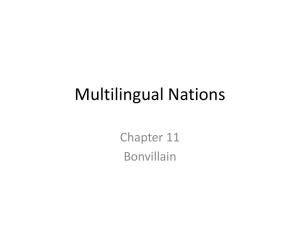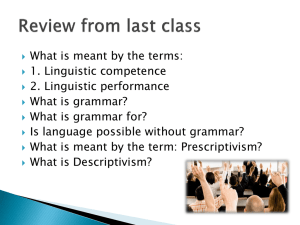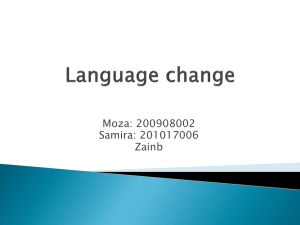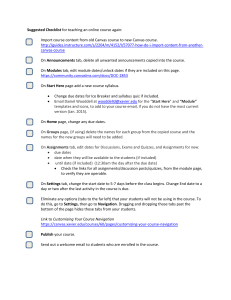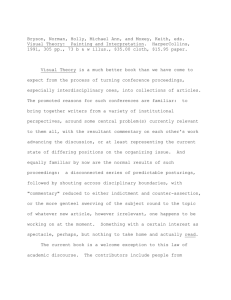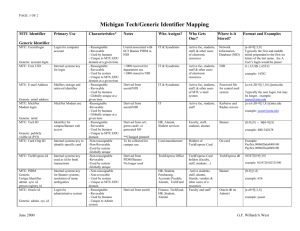HU241 Introduction to Linguistics - Humanities Digital Media Zone
advertisement
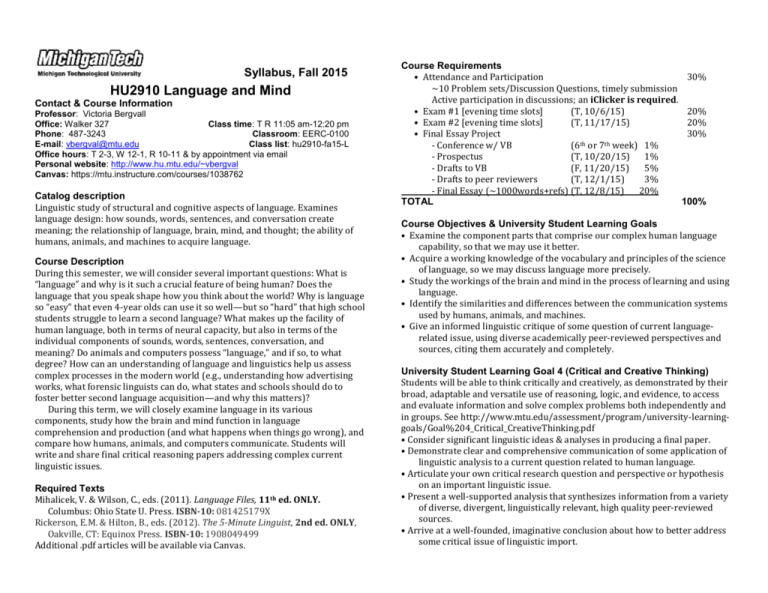
Syllabus, Fall 2015 HU2910 Language and Mind Contact & Course Information Professor: Victoria Bergvall Office: Walker 327 Class time: T R 11:05 am-12:20 pm Phone: 487-3243 Classroom: EERC-0100 E-mail: vbergval@mtu.edu Class list: hu2910-fa15-L Office hours: T 2-3, W 12-1, R 10-11 & by appointment via email Personal website: http://www.hu.mtu.edu/~vbergval Canvas: https://mtu.instructure.com/courses/1038762 Catalog description Linguistic study of structural and cognitive aspects of language. Examines language design: how sounds, words, sentences, and conversation create meaning; the relationship of language, brain, mind, and thought; the ability of humans, animals, and machines to acquire language. Course Description During this semester, we will consider several important questions: What is “language” and why is it such a crucial feature of being human? Does the language that you speak shape how you think about the world? Why is language so “easy” that even 4-year olds can use it so well—but so “hard” that high school students struggle to learn a second language? What makes up the facility of human language, both in terms of neural capacity, but also in terms of the individual components of sounds, words, sentences, conversation, and meaning? Do animals and computers possess “language,” and if so, to what degree? How can an understanding of language and linguistics help us assess complex processes in the modern world (e.g., understanding how advertising works, what forensic linguists can do, what states and schools should do to foster better second language acquisition—and why this matters)? During this term, we will closely examine language in its various components, study how the brain and mind function in language comprehension and production (and what happens when things go wrong), and compare how humans, animals, and computers communicate. Students will write and share final critical reasoning papers addressing complex current linguistic issues. Required Texts Mihalicek, V. & Wilson, C., eds. (2011). Language Files, 11th ed. ONLY. Columbus: Ohio State U. Press. ISBN-10: 081425179X Rickerson, E.M. & Hilton, B., eds. (2012). The 5-Minute Linguist, 2nd ed. ONLY, Oakville, CT: Equinox Press. ISBN-10: 1908049499 Additional .pdf articles will be available via Canvas. Course Requirements • Attendance and Participation ~10 Problem sets/Discussion Questions, timely submission Active participation in discussions; an iClicker is required. • Exam #1 [evening time slots] (T, 10/6/15) • Exam #2 [evening time slots] (T, 11/17/15) • Final Essay Project - Conference w/ VB (6th or 7th week) 1% - Prospectus (T, 10/20/15) 1% - Drafts to VB (F, 11/20/15) 5% - Drafts to peer reviewers (T, 12/1/15) 3% - Final Essay (~1000words+refs) (T, 12/8/15) 20% TOTAL 30% 20% 20% 30% 100% Course Objectives & University Student Learning Goals • Examine the component parts that comprise our complex human language capability, so that we may use it better. • Acquire a working knowledge of the vocabulary and principles of the science of language, so we may discuss language more precisely. • Study the workings of the brain and mind in the process of learning and using language. • Identify the similarities and differences between the communication systems used by humans, animals, and machines. • Give an informed linguistic critique of some question of current languagerelated issue, using diverse academically peer-reviewed perspectives and sources, citing them accurately and completely. University Student Learning Goal 4 (Critical and Creative Thinking) Students will be able to think critically and creatively, as demonstrated by their broad, adaptable and versatile use of reasoning, logic, and evidence, to access and evaluate information and solve complex problems both independently and in groups. See http://www.mtu.edu/assessment/program/university-learninggoals/Goal%204_Critical_CreativeThinking.pdf • Consider significant linguistic ideas & analyses in producing a final paper. • Demonstrate clear and comprehensive communication of some application of linguistic analysis to a current question related to human language. • Articulate your own critical research question and perspective or hypothesis on an important linguistic issue. • Present a well-supported analysis that synthesizes information from a variety of diverse, divergent, linguistically relevant, high quality peer-reviewed sources. • Arrive at a well-founded, imaginative conclusion about how to better address some critical issue of linguistic import. HU2910 Syllabus, p. 2 Grading System Letter Grade A AB B BC C CD D F I X Grade Percentage points/credit Rating 92% & above 4.00 Excellent 87% – 91.9% 3.50 Very good 82% – 86.9% 3.00 Good 77% – 81.9% 2.50 Above average 72% – 76.9% 2.00 Average 67% – 71.9% 1.50 Below average 60% - 66.9% 1.00 Inferior 59.9% and below 0.00 Failure Incomplete; given only when a student is unable to complete a segment of the course because of circumstances beyond the student’s control. A grade of incomplete may be given only when approved in writing by the Chair of Humanities. Conditional, with no grade points per credit; given only when the student is at fault in failing to complete a minor segment of a course, but in the judgment of the instructor does not need to repeat the course. It must be made up within the next semester in residence or the grade becomes a failure (F). A (X) grade is computed into the grade point average as a (F) grade. Details of Course Requirements & Policies Attendance & Participation Policy You must arrive in class with the assignment read and online assignments completed! This will enable you to join in the discussion and to ask informed questions. Generally, there are weekly problem sets or other assignments due, and at any point, I may give a short quiz via iClicker (which you must bring to every class). Much of the material in the book is quite detailed linguistically. My lectures and notes will give guidance on where to focus, but are not the sole basis of what we will cover. active engagement in class is very important. Notify me in writing (by e-mail) of any absences–in advance, if possible. NOTE: You get up to two absences (e.g., for illness or family emergencies) without penalty, but each unexcused class absence after the first two subtracts 5% from your total grade. Thus, missing 6 or more class periods severely reduces or zeroes out your total 30% participation grade. Be sure to notify me in writing of any legitimately excusable absences–in advance, if possible. (Members of University teams or those attending officially sanctioned academic events must notify me in advance to make arrangements about absences.) I will take attendance and give occasional quizzes or points for discussions via iClicker technology. NOTE: If you miss class and have someone sign in for you, and I discover that you are not there, you will lose double the points for that day. Policy on Illness If you come down with a highly contagious illness, e.g., seasonal flu, etc., stay home! But be sure to notify me by e-mail ASAP, and keep up by reading the textbook and submitting your coursework to me via Canvas. I may require official notification (e.g., doctor’s note, notification by the Dean of Students) of any on-going health or personal issue that causes you to miss class. Policy on late papers/assignments Papers that are late (because of excused absences) are accepted only with prior permission and arrangement. In most other cases, I will not accept late papers after the due dates (particularly after we have discussed answers in class); if I do accept late papers, I may systematically downgrade them (~5% or roughly a grade a day) according to their lateness. Please contact me ASAP if you have a truly legitimate reason for delay in turning a paper in. This is a “blended learning” course that will require a special kind of discipline: there is work you must do to prepare for discussion in class each day—reading, sometimes watching videos, doing problem sets, preparing discussion responses for questions we’ll consider more deeply within class. You must turn in problem sets by the due dates, and be prepared to discuss questions when asked. Preparation for class Try to begin each module by reading the text first. This will enable you to work through problem sets, join in discussions, and to ask informed questions. Generally, there are problem sets or other assignments due for each module (roughly 1 module per week). Much of the material in the book is quite detailed linguistically. My lectures (recorded and in class) will give guidance on where to focus, but are not the sole basis of what we will cover. I will expect you to read and extend your knowledge offline. Regular preparation and participation are required to keep up with the pace of ideas and information exchange in this class. I will frequently explain examples or topics not covered in the book. It is also your responsibility to read the material and to be prepared to discuss it. You learn linguistics by doing it; thus, Problem sets The assignments are designed to help you practice linguistic problem solving or to get you thinking about issues in the study of language. You may work HU2910 Syllabus, p. 3 together to solve problem sets, but do not simply copy others’ answers. You must be able to answer and defend your responses in class! These questions represent the kinds of questions you will be asked on exams, and the problem sets provide critical practice. Submit the problem sets or papers by the deadlines noted. Late problem sets may not receive credit, but it is important for you to practice doing the problems in any case. Please do these carefully, post to Canvas on time. and raise any difficulties during the class discussion. Examinations The two examinations generally cover the material of that section of class, but the material in some instances builds on previous work, so some questions in the second exam will be comprehensive. The exams often build on the exercises covered in the problem sets, which employ the kinds of analysis that linguists use to address problems and issues in language. The exams may have some short answer, multiple choice, and/or matching questions as well as essays. Again, it is critical to read the texts. I cannot cover all material in the class, and I will assume that you will be familiar with the general issues and approaches of the texts. NOTE: Exams will take place in Rekhi 215 on the days listed (10/6 and 11/17), at one of these times: 4-5:30 pm, 5:30-7 pm, or 8-9:30 pm. If you have an unavoidable conflict with those times, see me to arrange an alternative exam through the Testing Site in the Jackson Center in the Van Pelt Library. Final Essay The last part of the class addresses the critical application of linguistic analysis to some current issues (e.g., the use of animals in research, government use of linguistic systems in broad surveillance, the requirement of second language acquisition in Michigan schools). Students will research and compose a final 4page (~1000-1200 words + Reference Page) essay that demonstrates your ability to apply critical thinking about linguistic issues to address a major applied linguistic question (on approval from me, after a conference to discuss ideas). Note that this is not merely an expository paper, but one that poses a critical research question, seeks out sources, both pro and con, and arrives at a welljustified conclusion. To receive a passing grade on this assignment, students must demonstrate a clear ability to articulate a well-founded position on an approved linguistic topic on the basis of solid research, engage in critical thinking, and cite all source materials accurately and completely. Students will present a draft to me for approval and discuss their papers within peer review groups during the final weeks of class and before the final submission. Papers with incomplete citations will be returned ungraded. I strongly recommend that you consult either with the MTU Campus Multiliteracies Center (in the first floor, north side of Walker) for questions about writing papers, and/or the Purdue Online Writing Lab (OWL) for any specific questions about how to format citations: https://owl.english.purdue.edu/owl/resource/560/01/) University Assessment Student work products (exams, essays, projects, etc.) may be used for purposes of university, program, or course assessment. All work used for these assessment purposes (beyond the course) will not include any individual student identification. Selected essays from the class may be chosen to be evaluated as part of the university’s assessment of Student Learning Goal 4: Critical and Creative Thinking. This will have no effect on your grade for this course. NOTE: Keep copies of all stages of research on hand until you receive a final grade for the course, from research notes and sources to final form, in order to document and substantiate that this is your own research. I will give more details on this process and the project later in the semester. Other Important Course Policies Electronics in this “classroom” I give you my full attention during class; likewise, you must give me your full attention as well. You need to be present not just physically, but also mentally, and prepared and ready to participate in class. Thus, ALL ELECTRONIC DEVICES (such as laptops, iPads, cell phones, iPods, etc.) MUST BE TURNED OFF in the classroom (unless there is a compelling need and arrangements are made in advance with me). If you are expecting an important phone call and need to keep your cell phone on, let me know in advance. The phone should be set on vibrate; take the call outside the classroom. Exams must be taken in a zone free of any electronic devices and distractions. I expect that you will have iClickers and other current technology that will enable you to watch the videos on Canvas (or YouTube or other venues as assigned) before class, print off notes, and scan/upload occasional responses, as needed. Any information exchanges on these devices during quizzes or exams are also prohibited and violate the Academic Integrity Code of Michigan Tech. Academic Integrity Researchers often do their best work together, in consultation with others. However, taking the work of others and passing it off as your own is HU2910 Syllabus, p. 4 academic theft and will be punishable by failing the assignment/course or dismissal from school. All papers will be processed through Turnitin.com to check for similarities of writing, and any cases of suspected plagiarism will be turned over to the Dean of Students’ Office. See details about Michigan Tech’s Academic Integrity definitions, policies, and enforcement procedures at http://www.mtu.edu/dean/conduct/integrity/ You may consult with others on your papers for this class, but you must document all sources used, and you must write up the final form of the paper yourself (or clearly document your contributions to a group project). We will discuss the proper practice of research and citation during the term. See me or visit the Multiliteracies Center (http://www.mtu.edu/humanities/resources/mtmc/) if you have any questions about appropriate research processes or writing concerns. Institutional Equity Michigan Tech strives to offer equal opportunity to all of its employees, students, applicants for employment, and applicants for admission without regard to race, religion, color, national origin, age, gender [identity and expression], sexual orientation, height, weight, marital status, disabled veteran status, veteran status, arrest record, or disability. The Institutional Equity Office facilitates Michigan Tech's development of an environment that is free from prejudicial discrimination or harassment and that is conducive to learning and individual growth for all campus members and visitors. See http://www.mtu.edu/equity. For more information, contact the Institutional Equity Office, Room 308, Administration Building; Phone: 906-487-3310, Fax: 906-487-2842, Director: Jill Hodges, Ph.D., email: jhodges@mtu.edu. Accommodation for Disabilities MTU complies with all federal and state laws and regulations regarding discrimination, including the Americans with Disability Act of 1990 (ADA). If you have a disability and need a reasonable accommodation for equal access to education or services at MTU, please see the Dean of Students (487-2212) as soon as possible. See the Dean of Students’ website regarding Disability Services: http://www.mtu.edu/dean/disability/policies/ For other concerns about discrimination, you may contact your advisor, the Chair or Dean of your academic unit, the Humanities department head, or the Affirmative Action Office (487-3310). Abbreviations Some abbreviations that I commonly use: lg language lx linguistics lgst linguist PS Problem Set DQ Discussion Question Asst Assignment 5ML 5-Minute Linguist (course text) Ch chapter LF Language Files File Language File (module in course text) APA American Psychological Association (citation format) P-OWL the Purdue Online Writing Lab Schedule of Course Assignments The accompanying schedule presents my best estimate of the progress through the class; it maybe subject to change to meet class needs, upon formal notification to the class members. On the online syllabus, which will have the course readings and assignments specified, you may not see individual parts until the relevant week/module is made live week by week. The general format of the course will work like this: The course is arranged by Modules, which roughly correspond to different Files in the Language Files text, though the numbering is different, about one modules per week. Each week will have similar parts: 1) a reading assignment that you should do each week before or alongside my powerpoints; 2) short class lectures OR narrated powerpoints (posted onto Canvas): see directions each week for what you need watch before class discussion days; these encapsulate my lectures on linguistic terms and concepts, and demonstrate linguistic processes, analyses, and applications; 3) short problem sets (PSs) or discussion questions (DQs) prepared outside of class, to make sure you understand and practice the concepts from that module (usually due on Thurs. each week); and 4) class discussions of problem sets, discussion questions, etc.; iClickers may be used for attendance or quizzes, or to foster in-class discussion.

